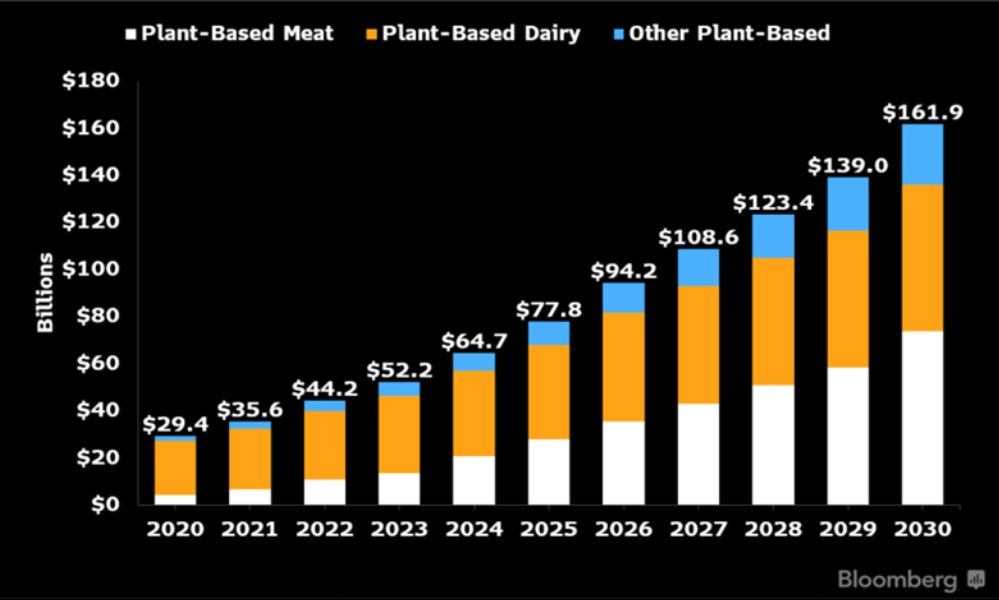Guest blogger, Steve Franke, asks if your supply chain is agile enough to stay competitive in the plant-based arena.
Sixty-two percent (~79 million) of U.S. households now buy plant-based products (oat milk, dairy-free cheese, plant-based pizza, etc.). "Alternative" products made from vegetables, fruits, whole grains, legumes, nuts, and seeds are now becoming mainstream. This is not a fad that will go away. According to a 2021 study from Good Food Institute (GFI) and the Plant-Based Foods Association, U.S. consumers spent $7.4 billion on plant-based meats alone last year. This is not only a 6% increase from the previous year; it's a 54% increase over the last five years. The chart below from Bloomberg Intelligence shows that projections have the plant-based industry (including plant-based dairy and other plant-based products) growing 5X in the next decade.
 Bloomberg Intelligence, OECD FAO Agricultural Outlook 2021-2030, GFI 2020 State of the Industry Report Bloomberg Intelligence, OECD FAO Agricultural Outlook 2021-2030, GFI 2020 State of the Industry Report |
This is a long-term, permanent change in buying behaviors of consumers. It's influenced heavily by Millenials and Gen Zers. They are more apt to purchase a product based on sustainability, animal welfare, and helping the environment than price, taste, or texture. Factor in now that the market is beginning to drive prices down and that companies are improving their ability to match meat, bread, and other staples in taste and texture; this trend is destined to become the norm moving forward to a broader consumer base. The intense market-driven push for companies to add plant-based foods to their menu has been clearly displayed in every food industry conference this year. Even the Sweets and Snacks 2022 Expo in Chicago had plant-based products that drew rave reviews.
It's an interesting time as the food industry feels the PULL from supply chain shortages in one area with the simultaneous need to PUSH new product lines in other areas based on consumer demands. This only heightens the need for supply chain technology like FoodLogiQ Connect, which can help you manage suppliers while giving the whole chain visibility and traceability.
"Not only do we now have greater use of technology in our document management system with greater control [with FoodLogiQ], we also have a consistent and transparent supplier approval program in place. We can easily stay on top of supplier audits and assessments. [FoodLogiQ's] Manage + Monitor has also helped us improve on recording, rectifying, and trending quality incidents, allowing [us] to have the evidence and report directly to the supplier to ensure a recoup of costs. It has empowered us to streamline our processes."
— Greg Sommerville, Vice President Global Procurement at Frontier Co-op.
Are you interested in learning more? Click here to get in contact with someone from our team.
Tag(s):
Food Industry
Other posts you might be interested in
View All Posts
Supplier Compliance
7 min read
| November 26, 2019
In Wake of Romaine Lettuce Recall, FoodLogiQ Calls Supply Chain Management and Food Traceability "More Important Than Ever"
Read More
Food Labeling
2 min read
| February 23, 2017
Health Canada’s Nutrition Facts Table Nutrient Changes Part 1
Read More
Product Formulation
10 min read
| February 24, 2023



